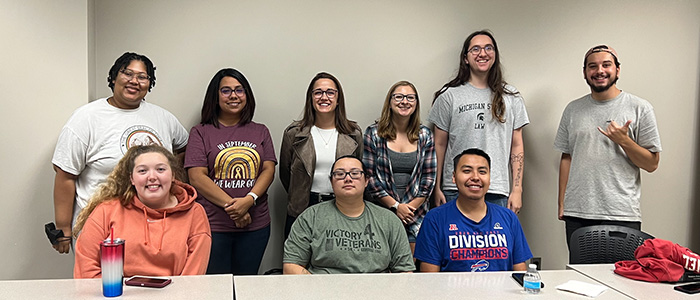Celebrating Indigenous Peoples’ Day at MSU Law
By Jake Jenkins
Email: jenki409@law.msu.edu
Oct. 10, 2022

[Editor’s Note: This is part of an on-going series of articles on MSU Law student organizations. Please let us know what your organization has planned for the year.]
Indigenous Peoples’ Day (alternative to Columbus Day) is celebrated on the second Monday in October each year. On Oct. 8, 2021, President Joe Biden became the first U.S. President to formally recognize the holiday, by signing a presidential proclamation declaring it to be a national holiday.
Indigenous Peoples' Day honors the past, present, and futures of Native people throughout the US. The holiday recognizes the legacy and impact of colonialism on Native communities, and it also celebrates the cultures, contributions, and resilience of contemporary Native people.
At Michigan State University College of Law, there are resources for students who are associated with Native American tribes.
The Native American Law Students Association (NALSA) articulates and promotes the professional needs and goals of Native Law Students and their allies; fosters and encourages professional competence.
“We are all about creating a safe space for Native students and allies of the native community,” said Sadie Harris, ’24, Vice President of NALSA. “We educate people on legal issues surrounding the Native community as well as send our member to conferences for those who are interested in Indian Law.”
The Indigenous Law & Policy Center (ILPC) provides services to Native students and students studying Indigenous Law. Staff in the Center provide classes for first year law students to ensure they are receiving all the assistance they need.
“We provide support to first-year Native American law students; so, we do a lot for surrounding the recruiting and retention of those students,” said Cassondra Church, Legal Counselor of the ILPC. “We represent different tribes through our Indian Law Clinic as well as operate our 13 credit Indigenous Law certificate program so that students can gain skills and training in the areas of Indigenous Law and policy.”
For many, being a Native American in Law comes with a sense of pride and representing people who come the same background as them.
“With the low number of Native American attorneys, it’s an opportunity for me to help others get to where they want to be in the legal field,” said Church. “I came to law school because I wanted to represent the interests of tribes and learn how to better advocate for and serve my community.”
“It’s all about resistance,” said Harris. “With everything Native people have gone through, fighting our way into laws, and being pushed out of the laws and seeing more Natives being involved in their communities and being educated on how laws work is an act of resistance itself.”
As many around the nation celebrate this day, MSU Law would like to highlight our resources surrounding the Indian law field and extend our support to everyone who fights for the rights of Native people in this U.S.

